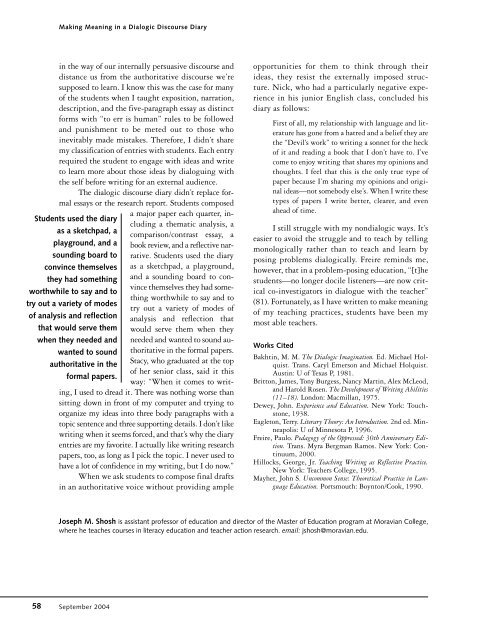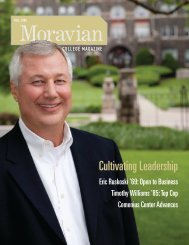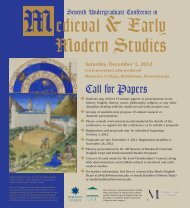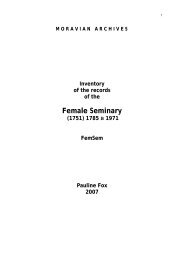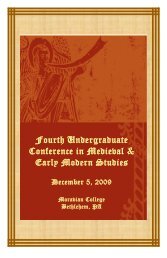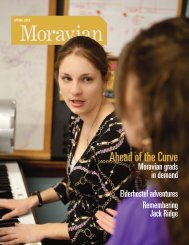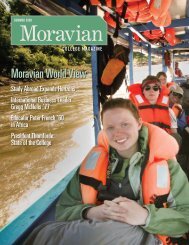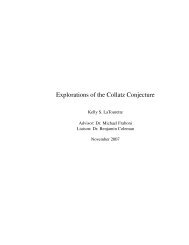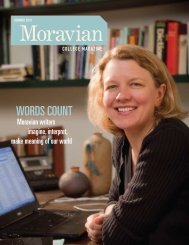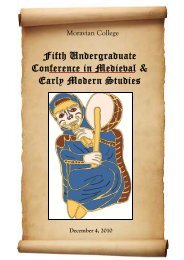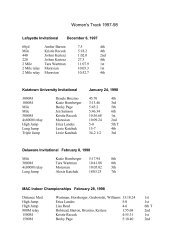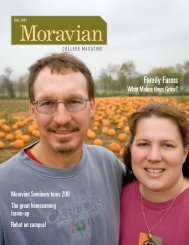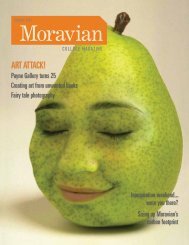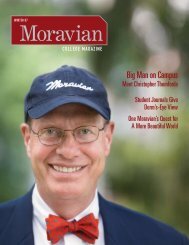Making Meaning in a Dialogic Discourse Diary - Moravian College
Making Meaning in a Dialogic Discourse Diary - Moravian College
Making Meaning in a Dialogic Discourse Diary - Moravian College
You also want an ePaper? Increase the reach of your titles
YUMPU automatically turns print PDFs into web optimized ePapers that Google loves.
<strong>Mak<strong>in</strong>g</strong> <strong>Mean<strong>in</strong>g</strong> <strong>in</strong> a <strong>Dialogic</strong> <strong>Discourse</strong> <strong>Diary</strong><br />
<strong>in</strong> the way of our <strong>in</strong>ternally persuasive discourse and<br />
distance us from the authoritative discourse we’re<br />
supposed to learn. I know this was the case for many<br />
of the students when I taught exposition, narration,<br />
description, and the five-paragraph essay as dist<strong>in</strong>ct<br />
forms with “to err is human” rules to be followed<br />
and punishment to be meted out to those who<br />
<strong>in</strong>evitably made mistakes. Therefore, I didn’t share<br />
my classification of entries with students. Each entry<br />
required the student to engage with ideas and write<br />
to learn more about those ideas by dialogu<strong>in</strong>g with<br />
the self before writ<strong>in</strong>g for an external audience.<br />
The dialogic discourse diary didn’t replace formal<br />
essays or the research report. Students composed<br />
Students used the diary<br />
as a sketchpad, a<br />
playground, and a<br />
sound<strong>in</strong>g board to<br />
conv<strong>in</strong>ce themselves<br />
they had someth<strong>in</strong>g<br />
worthwhile to say and to<br />
try out a variety of modes<br />
of analysis and reflection<br />
that would serve them<br />
when they needed and<br />
wanted to sound<br />
authoritative <strong>in</strong> the<br />
formal papers.<br />
a major paper each quarter, <strong>in</strong>clud<strong>in</strong>g<br />
a thematic analysis, a<br />
comparison/contrast essay, a<br />
book review, and a reflective narrative.<br />
Students used the diary<br />
as a sketchpad, a playground,<br />
and a sound<strong>in</strong>g board to conv<strong>in</strong>ce<br />
themselves they had someth<strong>in</strong>g<br />
worthwhile to say and to<br />
try out a variety of modes of<br />
analysis and reflection that<br />
would serve them when they<br />
needed and wanted to sound authoritative<br />
<strong>in</strong> the formal papers.<br />
Stacy, who graduated at the top<br />
of her senior class, said it this<br />
way: “When it comes to writ<strong>in</strong>g,<br />
I used to dread it. There was noth<strong>in</strong>g worse than<br />
sitt<strong>in</strong>g down <strong>in</strong> front of my computer and try<strong>in</strong>g to<br />
organize my ideas <strong>in</strong>to three body paragraphs with a<br />
topic sentence and three support<strong>in</strong>g details. I don’t like<br />
writ<strong>in</strong>g when it seems forced, and that’s why the diary<br />
entries are my favorite. I actually like writ<strong>in</strong>g research<br />
papers, too, as long as I pick the topic. I never used to<br />
have a lot of confidence <strong>in</strong> my writ<strong>in</strong>g, but I do now.”<br />
When we ask students to compose f<strong>in</strong>al drafts<br />
<strong>in</strong> an authoritative voice without provid<strong>in</strong>g ample<br />
opportunities for them to th<strong>in</strong>k through their<br />
ideas, they resist the externally imposed structure.<br />
Nick, who had a particularly negative experience<br />
<strong>in</strong> his junior English class, concluded his<br />
diary as follows:<br />
First of all, my relationship with language and literature<br />
has gone from a hatred and a belief they are<br />
the “Devil’s work” to writ<strong>in</strong>g a sonnet for the heck<br />
of it and read<strong>in</strong>g a book that I don’t have to. I’ve<br />
come to enjoy writ<strong>in</strong>g that shares my op<strong>in</strong>ions and<br />
thoughts. I feel that this is the only true type of<br />
paper because I’m shar<strong>in</strong>g my op<strong>in</strong>ions and orig<strong>in</strong>al<br />
ideas—not somebody else’s. When I write these<br />
types of papers I write better, clearer, and even<br />
ahead of time.<br />
I still struggle with my nondialogic ways. It’s<br />
easier to avoid the struggle and to teach by tell<strong>in</strong>g<br />
monologically rather than to teach and learn by<br />
pos<strong>in</strong>g problems dialogically. Freire rem<strong>in</strong>ds me,<br />
however, that <strong>in</strong> a problem-pos<strong>in</strong>g education, “[t]he<br />
students—no longer docile listeners—are now critical<br />
co-<strong>in</strong>vestigators <strong>in</strong> dialogue with the teacher”<br />
(81). Fortunately, as I have written to make mean<strong>in</strong>g<br />
of my teach<strong>in</strong>g practices, students have been my<br />
most able teachers.<br />
Works Cited<br />
Bakht<strong>in</strong>, M. M. The <strong>Dialogic</strong> Imag<strong>in</strong>ation. Ed. Michael Holquist.<br />
Trans. Caryl Emerson and Michael Holquist.<br />
Aust<strong>in</strong>: U of Texas P, 1981.<br />
Britton, James, Tony Burgess, Nancy Mart<strong>in</strong>, Alex McLeod,<br />
and Harold Rosen. The Development of Writ<strong>in</strong>g Abilities<br />
(11–18). London: Macmillan, 1975.<br />
Dewey, John. Experience and Education. New York: Touchstone,<br />
1938.<br />
Eagleton, Terry. Literary Theory: An Introduction. 2nd ed. M<strong>in</strong>neapolis:<br />
U of M<strong>in</strong>nesota P, 1996.<br />
Freire, Paulo. Pedagogy of the Oppressed: 30th Anniversary Edition.<br />
Trans. Myra Bergman Ramos. New York: Cont<strong>in</strong>uum,<br />
2000.<br />
Hillocks, George, Jr. Teach<strong>in</strong>g Writ<strong>in</strong>g as Reflective Practice.<br />
New York: Teachers <strong>College</strong>, 1995.<br />
Mayher, John S. Uncommon Sense: Theoretical Practice <strong>in</strong> Language<br />
Education. Portsmouth: Boynton/Cook, 1990.<br />
Joseph M. Shosh is assistant professor of education and director of the Master of Education program at <strong>Moravian</strong> <strong>College</strong>,<br />
where he teaches courses <strong>in</strong> literacy education and teacher action research. email: jshosh@moravian.edu.<br />
58 September 2004


